Unit 9: Entrepreneurship and Small Business Management (ESBM)
VerifiedAdded on 2023/01/03
|14
|3328
|88
AI Summary
Contribute Materials
Your contribution can guide someone’s learning journey. Share your
documents today.

Secure Best Marks with AI Grader
Need help grading? Try our AI Grader for instant feedback on your assignments.

Unit 9: Entrepreneurship and
Small Business Management
(ESBM)
Small Business Management
(ESBM)

Unit 9: Entrepreneurship and
Small Business Management
(ESBM)
Small Business Management
(ESBM)
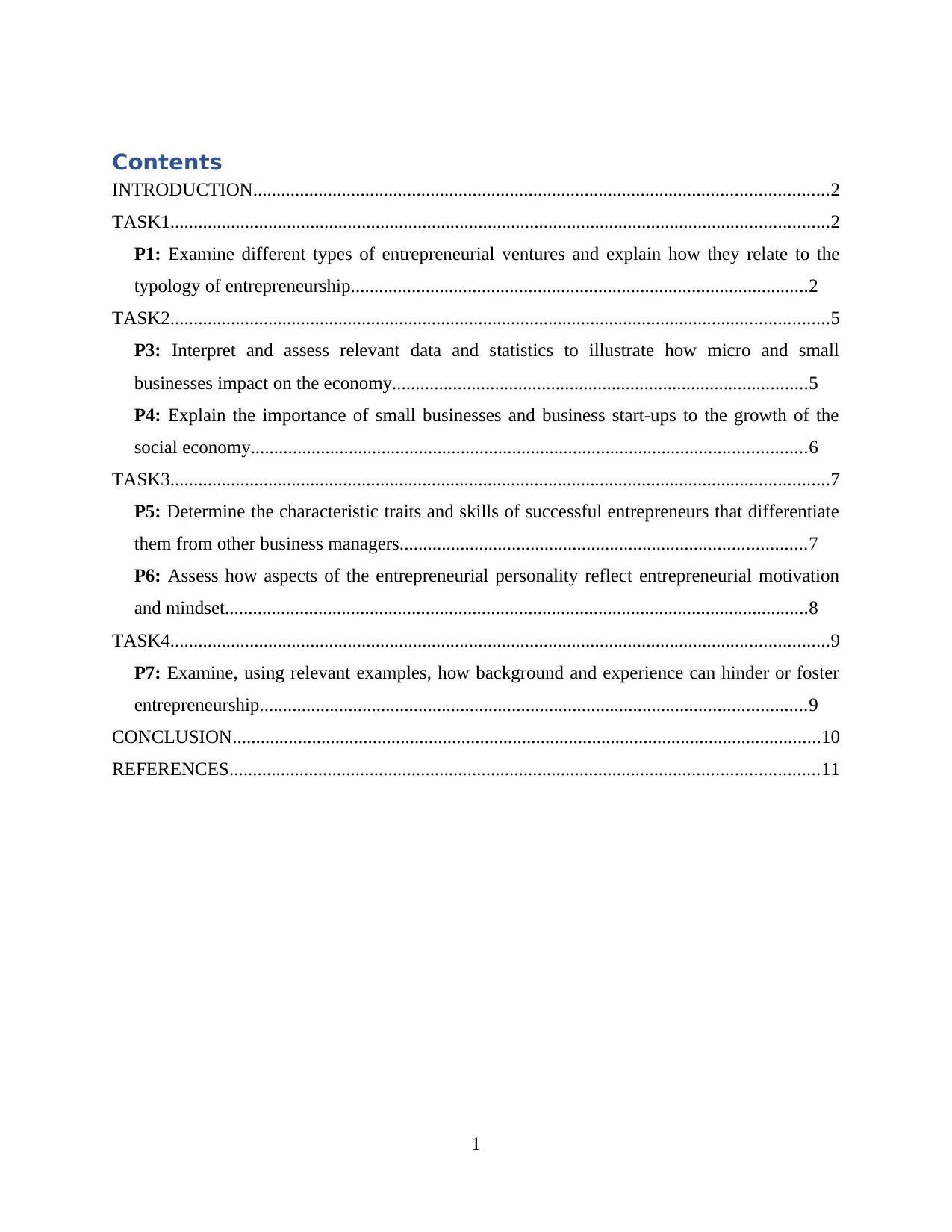
Contents
INTRODUCTION...........................................................................................................................2
TASK1.............................................................................................................................................2
P1: Examine different types of entrepreneurial ventures and explain how they relate to the
typology of entrepreneurship..................................................................................................2
TASK2.............................................................................................................................................5
P3: Interpret and assess relevant data and statistics to illustrate how micro and small
businesses impact on the economy.........................................................................................5
P4: Explain the importance of small businesses and business start-ups to the growth of the
social economy.......................................................................................................................6
TASK3.............................................................................................................................................7
P5: Determine the characteristic traits and skills of successful entrepreneurs that differentiate
them from other business managers.......................................................................................7
P6: Assess how aspects of the entrepreneurial personality reflect entrepreneurial motivation
and mindset.............................................................................................................................8
TASK4.............................................................................................................................................9
P7: Examine, using relevant examples, how background and experience can hinder or foster
entrepreneurship.....................................................................................................................9
CONCLUSION..............................................................................................................................10
REFERENCES..............................................................................................................................11
1
INTRODUCTION...........................................................................................................................2
TASK1.............................................................................................................................................2
P1: Examine different types of entrepreneurial ventures and explain how they relate to the
typology of entrepreneurship..................................................................................................2
TASK2.............................................................................................................................................5
P3: Interpret and assess relevant data and statistics to illustrate how micro and small
businesses impact on the economy.........................................................................................5
P4: Explain the importance of small businesses and business start-ups to the growth of the
social economy.......................................................................................................................6
TASK3.............................................................................................................................................7
P5: Determine the characteristic traits and skills of successful entrepreneurs that differentiate
them from other business managers.......................................................................................7
P6: Assess how aspects of the entrepreneurial personality reflect entrepreneurial motivation
and mindset.............................................................................................................................8
TASK4.............................................................................................................................................9
P7: Examine, using relevant examples, how background and experience can hinder or foster
entrepreneurship.....................................................................................................................9
CONCLUSION..............................................................................................................................10
REFERENCES..............................................................................................................................11
1
Secure Best Marks with AI Grader
Need help grading? Try our AI Grader for instant feedback on your assignments.

INTRODUCTION
Entrepreneurship is defined as the business discipline where entrepreneurs take
responsibility of risk comes within the business enterprise in order to apply business ideas that
are new and innovative. It is the creation and process of designing, introducing and running a
business, which often initially a small business or the capacity & willingness to develop,
organise and manage a business venture along with risks to make profit. Entrepreneur is refers as
2
Entrepreneurship is defined as the business discipline where entrepreneurs take
responsibility of risk comes within the business enterprise in order to apply business ideas that
are new and innovative. It is the creation and process of designing, introducing and running a
business, which often initially a small business or the capacity & willingness to develop,
organise and manage a business venture along with risks to make profit. Entrepreneur is refers as
2
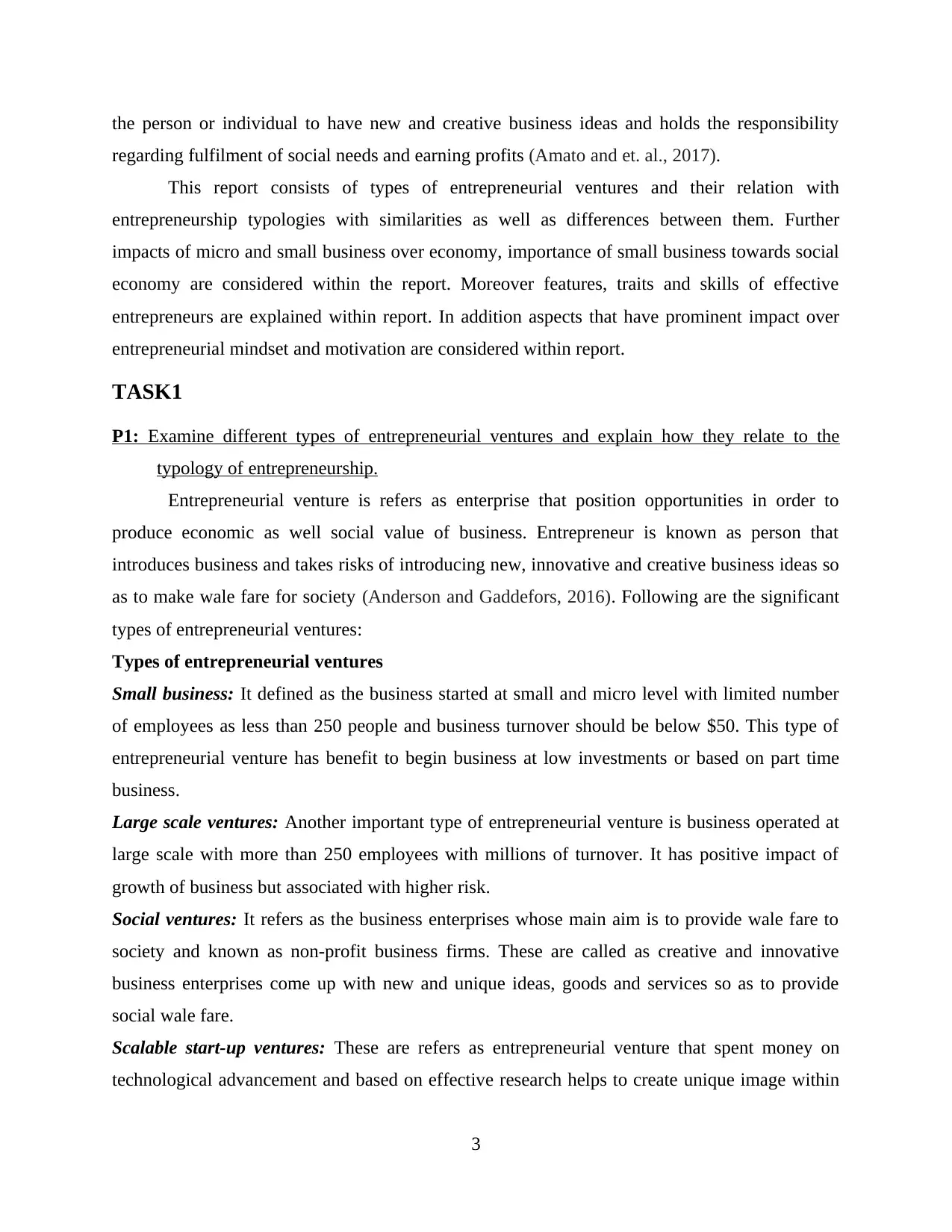
the person or individual to have new and creative business ideas and holds the responsibility
regarding fulfilment of social needs and earning profits (Amato and et. al., 2017).
This report consists of types of entrepreneurial ventures and their relation with
entrepreneurship typologies with similarities as well as differences between them. Further
impacts of micro and small business over economy, importance of small business towards social
economy are considered within the report. Moreover features, traits and skills of effective
entrepreneurs are explained within report. In addition aspects that have prominent impact over
entrepreneurial mindset and motivation are considered within report.
TASK1
P1: Examine different types of entrepreneurial ventures and explain how they relate to the
typology of entrepreneurship.
Entrepreneurial venture is refers as enterprise that position opportunities in order to
produce economic as well social value of business. Entrepreneur is known as person that
introduces business and takes risks of introducing new, innovative and creative business ideas so
as to make wale fare for society (Anderson and Gaddefors, 2016). Following are the significant
types of entrepreneurial ventures:
Types of entrepreneurial ventures
Small business: It defined as the business started at small and micro level with limited number
of employees as less than 250 people and business turnover should be below $50. This type of
entrepreneurial venture has benefit to begin business at low investments or based on part time
business.
Large scale ventures: Another important type of entrepreneurial venture is business operated at
large scale with more than 250 employees with millions of turnover. It has positive impact of
growth of business but associated with higher risk.
Social ventures: It refers as the business enterprises whose main aim is to provide wale fare to
society and known as non-profit business firms. These are called as creative and innovative
business enterprises come up with new and unique ideas, goods and services so as to provide
social wale fare.
Scalable start-up ventures: These are refers as entrepreneurial venture that spent money on
technological advancement and based on effective research helps to create unique image within
3
regarding fulfilment of social needs and earning profits (Amato and et. al., 2017).
This report consists of types of entrepreneurial ventures and their relation with
entrepreneurship typologies with similarities as well as differences between them. Further
impacts of micro and small business over economy, importance of small business towards social
economy are considered within the report. Moreover features, traits and skills of effective
entrepreneurs are explained within report. In addition aspects that have prominent impact over
entrepreneurial mindset and motivation are considered within report.
TASK1
P1: Examine different types of entrepreneurial ventures and explain how they relate to the
typology of entrepreneurship.
Entrepreneurial venture is refers as enterprise that position opportunities in order to
produce economic as well social value of business. Entrepreneur is known as person that
introduces business and takes risks of introducing new, innovative and creative business ideas so
as to make wale fare for society (Anderson and Gaddefors, 2016). Following are the significant
types of entrepreneurial ventures:
Types of entrepreneurial ventures
Small business: It defined as the business started at small and micro level with limited number
of employees as less than 250 people and business turnover should be below $50. This type of
entrepreneurial venture has benefit to begin business at low investments or based on part time
business.
Large scale ventures: Another important type of entrepreneurial venture is business operated at
large scale with more than 250 employees with millions of turnover. It has positive impact of
growth of business but associated with higher risk.
Social ventures: It refers as the business enterprises whose main aim is to provide wale fare to
society and known as non-profit business firms. These are called as creative and innovative
business enterprises come up with new and unique ideas, goods and services so as to provide
social wale fare.
Scalable start-up ventures: These are refers as entrepreneurial venture that spent money on
technological advancement and based on effective research helps to create unique image within
3
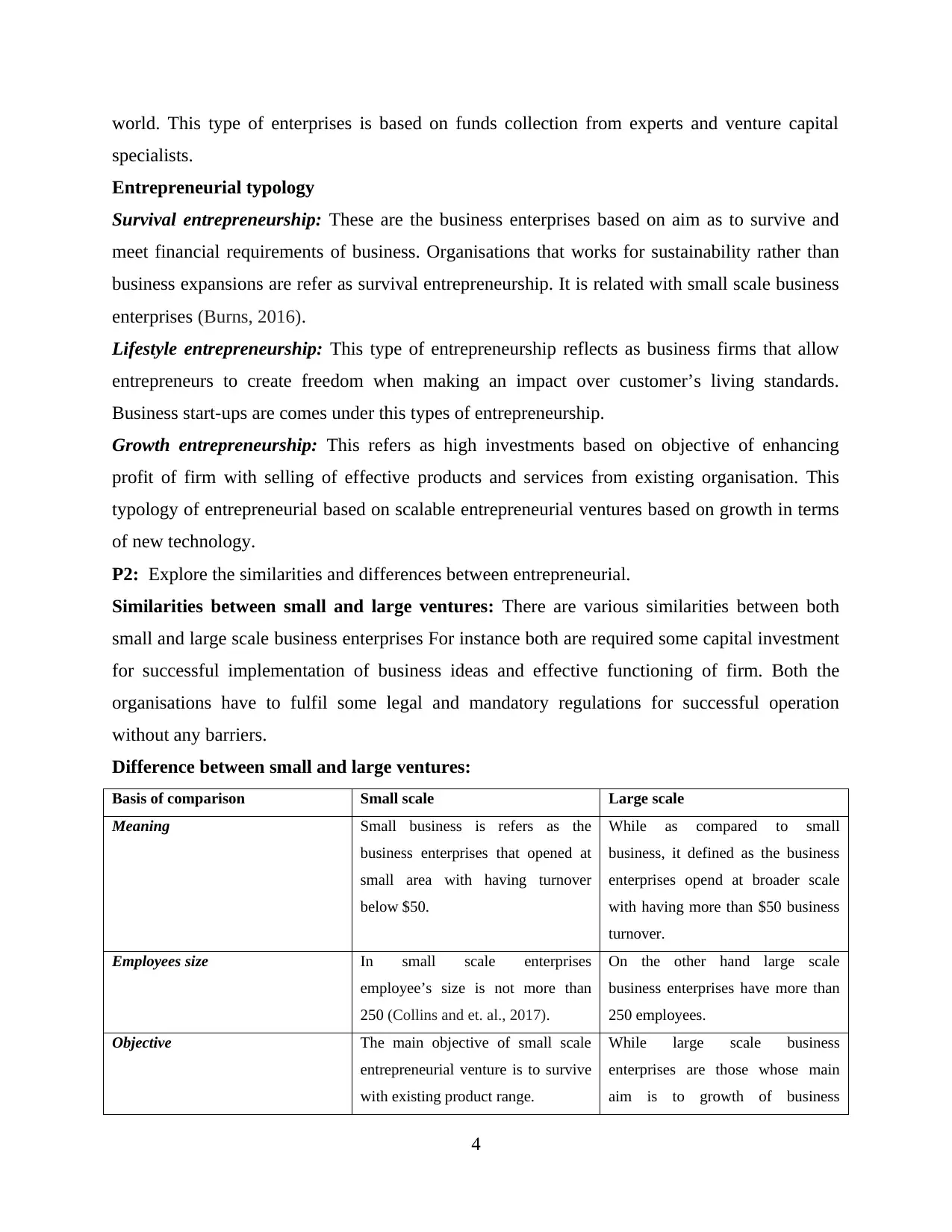
world. This type of enterprises is based on funds collection from experts and venture capital
specialists.
Entrepreneurial typology
Survival entrepreneurship: These are the business enterprises based on aim as to survive and
meet financial requirements of business. Organisations that works for sustainability rather than
business expansions are refer as survival entrepreneurship. It is related with small scale business
enterprises (Burns, 2016).
Lifestyle entrepreneurship: This type of entrepreneurship reflects as business firms that allow
entrepreneurs to create freedom when making an impact over customer’s living standards.
Business start-ups are comes under this types of entrepreneurship.
Growth entrepreneurship: This refers as high investments based on objective of enhancing
profit of firm with selling of effective products and services from existing organisation. This
typology of entrepreneurial based on scalable entrepreneurial ventures based on growth in terms
of new technology.
P2: Explore the similarities and differences between entrepreneurial.
Similarities between small and large ventures: There are various similarities between both
small and large scale business enterprises For instance both are required some capital investment
for successful implementation of business ideas and effective functioning of firm. Both the
organisations have to fulfil some legal and mandatory regulations for successful operation
without any barriers.
Difference between small and large ventures:
Basis of comparison Small scale Large scale
Meaning Small business is refers as the
business enterprises that opened at
small area with having turnover
below $50.
While as compared to small
business, it defined as the business
enterprises opend at broader scale
with having more than $50 business
turnover.
Employees size In small scale enterprises
employee’s size is not more than
250 (Collins and et. al., 2017).
On the other hand large scale
business enterprises have more than
250 employees.
Objective The main objective of small scale
entrepreneurial venture is to survive
with existing product range.
While large scale business
enterprises are those whose main
aim is to growth of business
4
specialists.
Entrepreneurial typology
Survival entrepreneurship: These are the business enterprises based on aim as to survive and
meet financial requirements of business. Organisations that works for sustainability rather than
business expansions are refer as survival entrepreneurship. It is related with small scale business
enterprises (Burns, 2016).
Lifestyle entrepreneurship: This type of entrepreneurship reflects as business firms that allow
entrepreneurs to create freedom when making an impact over customer’s living standards.
Business start-ups are comes under this types of entrepreneurship.
Growth entrepreneurship: This refers as high investments based on objective of enhancing
profit of firm with selling of effective products and services from existing organisation. This
typology of entrepreneurial based on scalable entrepreneurial ventures based on growth in terms
of new technology.
P2: Explore the similarities and differences between entrepreneurial.
Similarities between small and large ventures: There are various similarities between both
small and large scale business enterprises For instance both are required some capital investment
for successful implementation of business ideas and effective functioning of firm. Both the
organisations have to fulfil some legal and mandatory regulations for successful operation
without any barriers.
Difference between small and large ventures:
Basis of comparison Small scale Large scale
Meaning Small business is refers as the
business enterprises that opened at
small area with having turnover
below $50.
While as compared to small
business, it defined as the business
enterprises opend at broader scale
with having more than $50 business
turnover.
Employees size In small scale enterprises
employee’s size is not more than
250 (Collins and et. al., 2017).
On the other hand large scale
business enterprises have more than
250 employees.
Objective The main objective of small scale
entrepreneurial venture is to survive
with existing product range.
While large scale business
enterprises are those whose main
aim is to growth of business
4
Paraphrase This Document
Need a fresh take? Get an instant paraphrase of this document with our AI Paraphraser
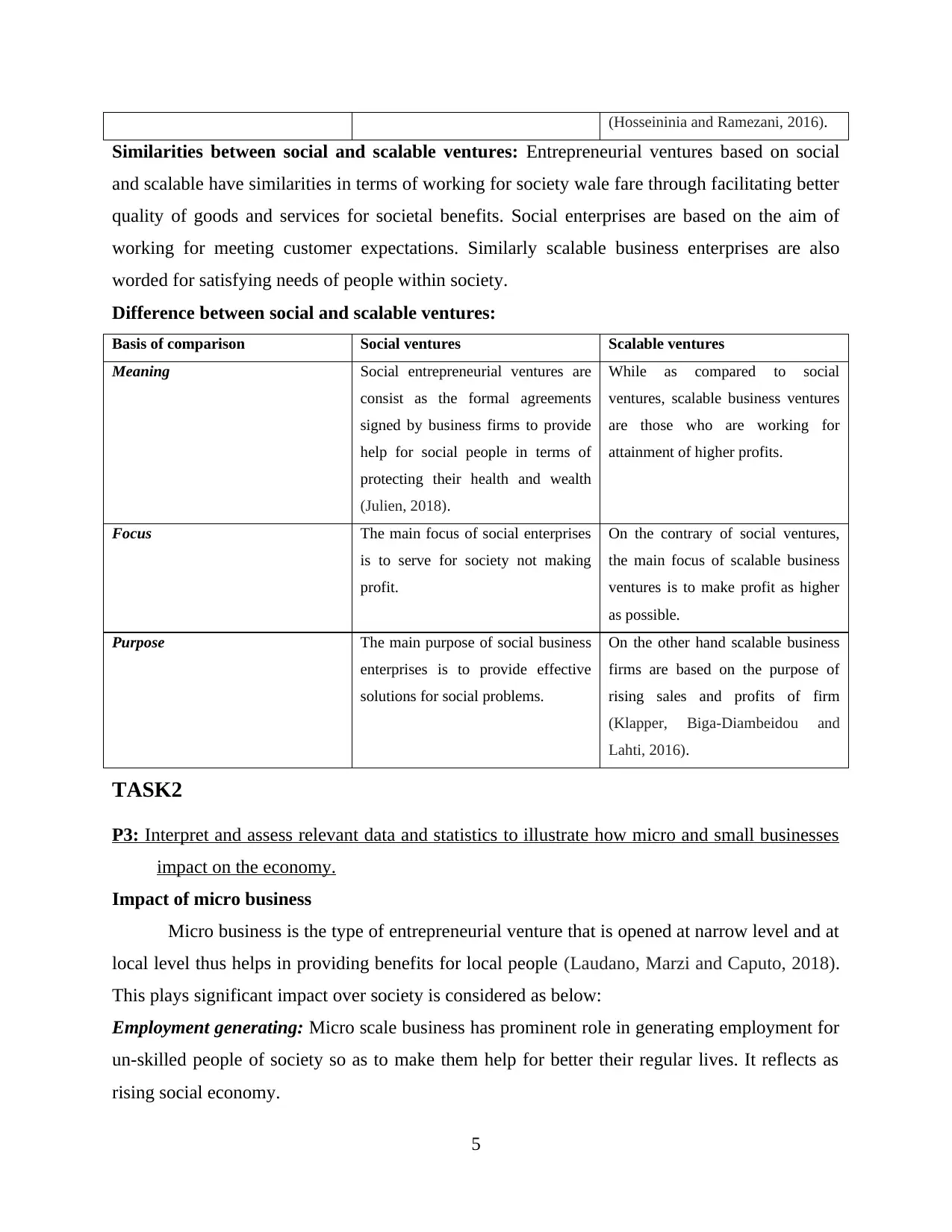
(Hosseininia and Ramezani, 2016).
Similarities between social and scalable ventures: Entrepreneurial ventures based on social
and scalable have similarities in terms of working for society wale fare through facilitating better
quality of goods and services for societal benefits. Social enterprises are based on the aim of
working for meeting customer expectations. Similarly scalable business enterprises are also
worded for satisfying needs of people within society.
Difference between social and scalable ventures:
Basis of comparison Social ventures Scalable ventures
Meaning Social entrepreneurial ventures are
consist as the formal agreements
signed by business firms to provide
help for social people in terms of
protecting their health and wealth
(Julien, 2018).
While as compared to social
ventures, scalable business ventures
are those who are working for
attainment of higher profits.
Focus The main focus of social enterprises
is to serve for society not making
profit.
On the contrary of social ventures,
the main focus of scalable business
ventures is to make profit as higher
as possible.
Purpose The main purpose of social business
enterprises is to provide effective
solutions for social problems.
On the other hand scalable business
firms are based on the purpose of
rising sales and profits of firm
(Klapper, Biga-Diambeidou and
Lahti, 2016).
TASK2
P3: Interpret and assess relevant data and statistics to illustrate how micro and small businesses
impact on the economy.
Impact of micro business
Micro business is the type of entrepreneurial venture that is opened at narrow level and at
local level thus helps in providing benefits for local people (Laudano, Marzi and Caputo, 2018).
This plays significant impact over society is considered as below:
Employment generating: Micro scale business has prominent role in generating employment for
un-skilled people of society so as to make them help for better their regular lives. It reflects as
rising social economy.
5
Similarities between social and scalable ventures: Entrepreneurial ventures based on social
and scalable have similarities in terms of working for society wale fare through facilitating better
quality of goods and services for societal benefits. Social enterprises are based on the aim of
working for meeting customer expectations. Similarly scalable business enterprises are also
worded for satisfying needs of people within society.
Difference between social and scalable ventures:
Basis of comparison Social ventures Scalable ventures
Meaning Social entrepreneurial ventures are
consist as the formal agreements
signed by business firms to provide
help for social people in terms of
protecting their health and wealth
(Julien, 2018).
While as compared to social
ventures, scalable business ventures
are those who are working for
attainment of higher profits.
Focus The main focus of social enterprises
is to serve for society not making
profit.
On the contrary of social ventures,
the main focus of scalable business
ventures is to make profit as higher
as possible.
Purpose The main purpose of social business
enterprises is to provide effective
solutions for social problems.
On the other hand scalable business
firms are based on the purpose of
rising sales and profits of firm
(Klapper, Biga-Diambeidou and
Lahti, 2016).
TASK2
P3: Interpret and assess relevant data and statistics to illustrate how micro and small businesses
impact on the economy.
Impact of micro business
Micro business is the type of entrepreneurial venture that is opened at narrow level and at
local level thus helps in providing benefits for local people (Laudano, Marzi and Caputo, 2018).
This plays significant impact over society is considered as below:
Employment generating: Micro scale business has prominent role in generating employment for
un-skilled people of society so as to make them help for better their regular lives. It reflects as
rising social economy.
5
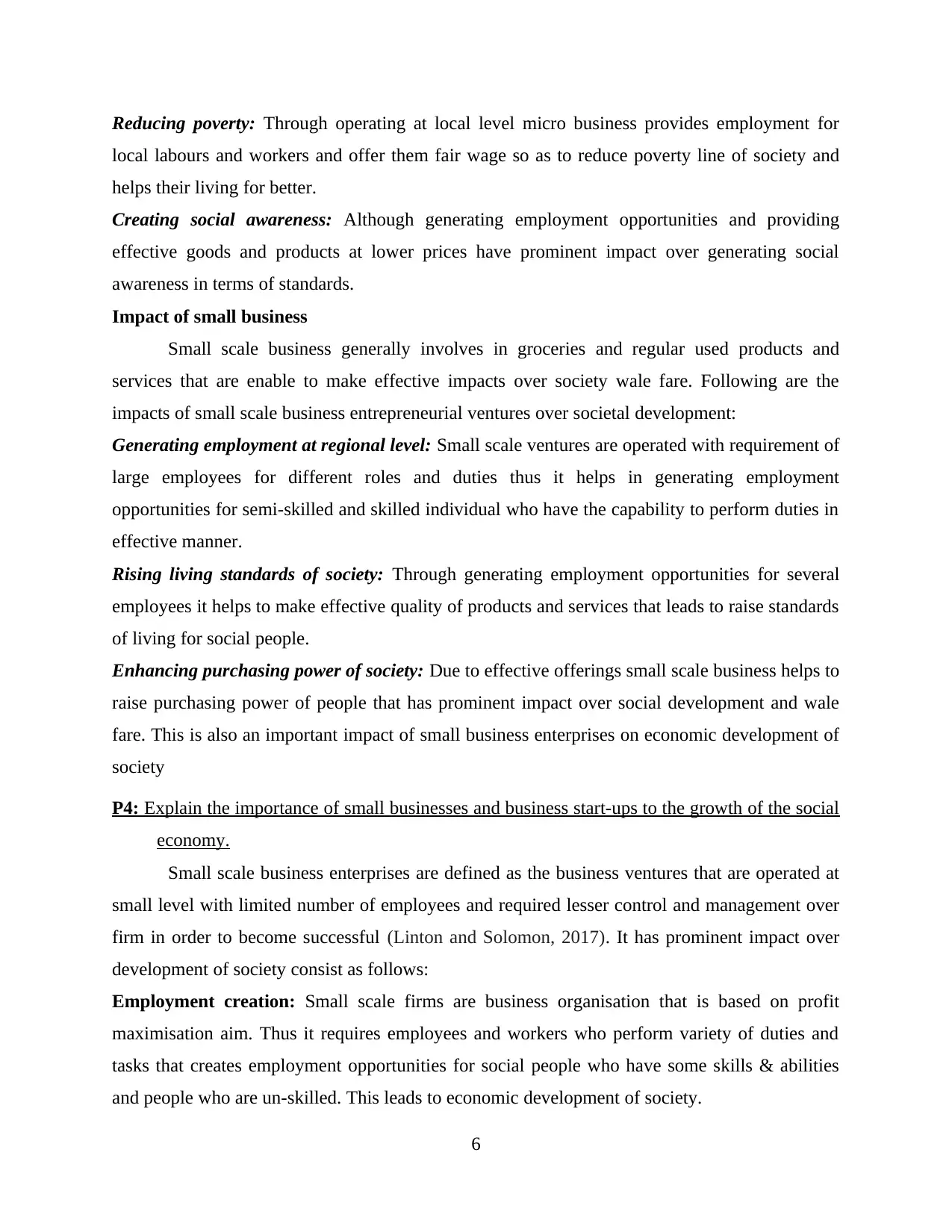
Reducing poverty: Through operating at local level micro business provides employment for
local labours and workers and offer them fair wage so as to reduce poverty line of society and
helps their living for better.
Creating social awareness: Although generating employment opportunities and providing
effective goods and products at lower prices have prominent impact over generating social
awareness in terms of standards.
Impact of small business
Small scale business generally involves in groceries and regular used products and
services that are enable to make effective impacts over society wale fare. Following are the
impacts of small scale business entrepreneurial ventures over societal development:
Generating employment at regional level: Small scale ventures are operated with requirement of
large employees for different roles and duties thus it helps in generating employment
opportunities for semi-skilled and skilled individual who have the capability to perform duties in
effective manner.
Rising living standards of society: Through generating employment opportunities for several
employees it helps to make effective quality of products and services that leads to raise standards
of living for social people.
Enhancing purchasing power of society: Due to effective offerings small scale business helps to
raise purchasing power of people that has prominent impact over social development and wale
fare. This is also an important impact of small business enterprises on economic development of
society
P4: Explain the importance of small businesses and business start-ups to the growth of the social
economy.
Small scale business enterprises are defined as the business ventures that are operated at
small level with limited number of employees and required lesser control and management over
firm in order to become successful (Linton and Solomon, 2017). It has prominent impact over
development of society consist as follows:
Employment creation: Small scale firms are business organisation that is based on profit
maximisation aim. Thus it requires employees and workers who perform variety of duties and
tasks that creates employment opportunities for social people who have some skills & abilities
and people who are un-skilled. This leads to economic development of society.
6
local labours and workers and offer them fair wage so as to reduce poverty line of society and
helps their living for better.
Creating social awareness: Although generating employment opportunities and providing
effective goods and products at lower prices have prominent impact over generating social
awareness in terms of standards.
Impact of small business
Small scale business generally involves in groceries and regular used products and
services that are enable to make effective impacts over society wale fare. Following are the
impacts of small scale business entrepreneurial ventures over societal development:
Generating employment at regional level: Small scale ventures are operated with requirement of
large employees for different roles and duties thus it helps in generating employment
opportunities for semi-skilled and skilled individual who have the capability to perform duties in
effective manner.
Rising living standards of society: Through generating employment opportunities for several
employees it helps to make effective quality of products and services that leads to raise standards
of living for social people.
Enhancing purchasing power of society: Due to effective offerings small scale business helps to
raise purchasing power of people that has prominent impact over social development and wale
fare. This is also an important impact of small business enterprises on economic development of
society
P4: Explain the importance of small businesses and business start-ups to the growth of the social
economy.
Small scale business enterprises are defined as the business ventures that are operated at
small level with limited number of employees and required lesser control and management over
firm in order to become successful (Linton and Solomon, 2017). It has prominent impact over
development of society consist as follows:
Employment creation: Small scale firms are business organisation that is based on profit
maximisation aim. Thus it requires employees and workers who perform variety of duties and
tasks that creates employment opportunities for social people who have some skills & abilities
and people who are un-skilled. This leads to economic development of society.
6
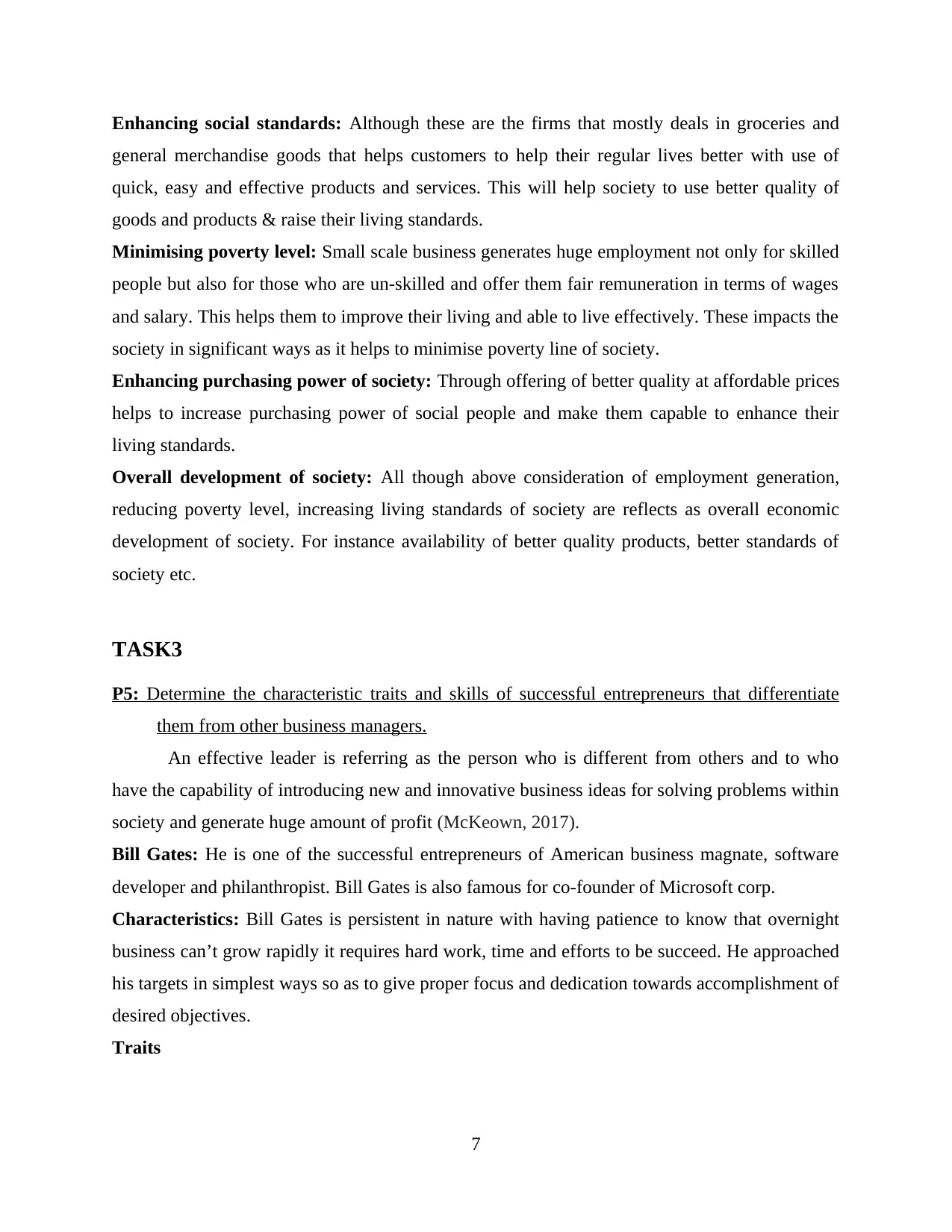
Enhancing social standards: Although these are the firms that mostly deals in groceries and
general merchandise goods that helps customers to help their regular lives better with use of
quick, easy and effective products and services. This will help society to use better quality of
goods and products & raise their living standards.
Minimising poverty level: Small scale business generates huge employment not only for skilled
people but also for those who are un-skilled and offer them fair remuneration in terms of wages
and salary. This helps them to improve their living and able to live effectively. These impacts the
society in significant ways as it helps to minimise poverty line of society.
Enhancing purchasing power of society: Through offering of better quality at affordable prices
helps to increase purchasing power of social people and make them capable to enhance their
living standards.
Overall development of society: All though above consideration of employment generation,
reducing poverty level, increasing living standards of society are reflects as overall economic
development of society. For instance availability of better quality products, better standards of
society etc.
TASK3
P5: Determine the characteristic traits and skills of successful entrepreneurs that differentiate
them from other business managers.
An effective leader is referring as the person who is different from others and to who
have the capability of introducing new and innovative business ideas for solving problems within
society and generate huge amount of profit (McKeown, 2017).
Bill Gates: He is one of the successful entrepreneurs of American business magnate, software
developer and philanthropist. Bill Gates is also famous for co-founder of Microsoft corp.
Characteristics: Bill Gates is persistent in nature with having patience to know that overnight
business can’t grow rapidly it requires hard work, time and efforts to be succeed. He approached
his targets in simplest ways so as to give proper focus and dedication towards accomplishment of
desired objectives.
Traits
7
general merchandise goods that helps customers to help their regular lives better with use of
quick, easy and effective products and services. This will help society to use better quality of
goods and products & raise their living standards.
Minimising poverty level: Small scale business generates huge employment not only for skilled
people but also for those who are un-skilled and offer them fair remuneration in terms of wages
and salary. This helps them to improve their living and able to live effectively. These impacts the
society in significant ways as it helps to minimise poverty line of society.
Enhancing purchasing power of society: Through offering of better quality at affordable prices
helps to increase purchasing power of social people and make them capable to enhance their
living standards.
Overall development of society: All though above consideration of employment generation,
reducing poverty level, increasing living standards of society are reflects as overall economic
development of society. For instance availability of better quality products, better standards of
society etc.
TASK3
P5: Determine the characteristic traits and skills of successful entrepreneurs that differentiate
them from other business managers.
An effective leader is referring as the person who is different from others and to who
have the capability of introducing new and innovative business ideas for solving problems within
society and generate huge amount of profit (McKeown, 2017).
Bill Gates: He is one of the successful entrepreneurs of American business magnate, software
developer and philanthropist. Bill Gates is also famous for co-founder of Microsoft corp.
Characteristics: Bill Gates is persistent in nature with having patience to know that overnight
business can’t grow rapidly it requires hard work, time and efforts to be succeed. He approached
his targets in simplest ways so as to give proper focus and dedication towards accomplishment of
desired objectives.
Traits
7
Secure Best Marks with AI Grader
Need help grading? Try our AI Grader for instant feedback on your assignments.
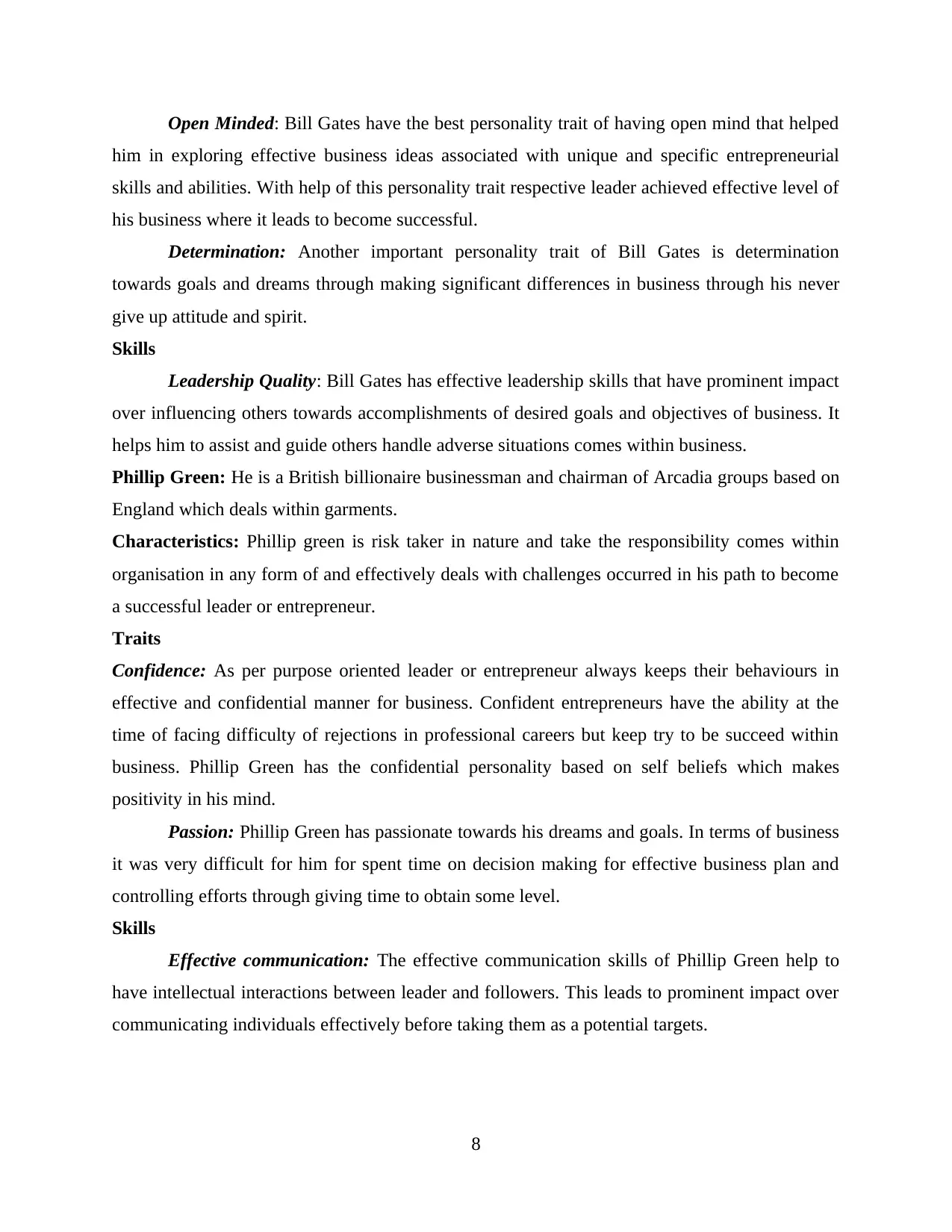
Open Minded: Bill Gates have the best personality trait of having open mind that helped
him in exploring effective business ideas associated with unique and specific entrepreneurial
skills and abilities. With help of this personality trait respective leader achieved effective level of
his business where it leads to become successful.
Determination: Another important personality trait of Bill Gates is determination
towards goals and dreams through making significant differences in business through his never
give up attitude and spirit.
Skills
Leadership Quality: Bill Gates has effective leadership skills that have prominent impact
over influencing others towards accomplishments of desired goals and objectives of business. It
helps him to assist and guide others handle adverse situations comes within business.
Phillip Green: He is a British billionaire businessman and chairman of Arcadia groups based on
England which deals within garments.
Characteristics: Phillip green is risk taker in nature and take the responsibility comes within
organisation in any form of and effectively deals with challenges occurred in his path to become
a successful leader or entrepreneur.
Traits
Confidence: As per purpose oriented leader or entrepreneur always keeps their behaviours in
effective and confidential manner for business. Confident entrepreneurs have the ability at the
time of facing difficulty of rejections in professional careers but keep try to be succeed within
business. Phillip Green has the confidential personality based on self beliefs which makes
positivity in his mind.
Passion: Phillip Green has passionate towards his dreams and goals. In terms of business
it was very difficult for him for spent time on decision making for effective business plan and
controlling efforts through giving time to obtain some level.
Skills
Effective communication: The effective communication skills of Phillip Green help to
have intellectual interactions between leader and followers. This leads to prominent impact over
communicating individuals effectively before taking them as a potential targets.
8
him in exploring effective business ideas associated with unique and specific entrepreneurial
skills and abilities. With help of this personality trait respective leader achieved effective level of
his business where it leads to become successful.
Determination: Another important personality trait of Bill Gates is determination
towards goals and dreams through making significant differences in business through his never
give up attitude and spirit.
Skills
Leadership Quality: Bill Gates has effective leadership skills that have prominent impact
over influencing others towards accomplishments of desired goals and objectives of business. It
helps him to assist and guide others handle adverse situations comes within business.
Phillip Green: He is a British billionaire businessman and chairman of Arcadia groups based on
England which deals within garments.
Characteristics: Phillip green is risk taker in nature and take the responsibility comes within
organisation in any form of and effectively deals with challenges occurred in his path to become
a successful leader or entrepreneur.
Traits
Confidence: As per purpose oriented leader or entrepreneur always keeps their behaviours in
effective and confidential manner for business. Confident entrepreneurs have the ability at the
time of facing difficulty of rejections in professional careers but keep try to be succeed within
business. Phillip Green has the confidential personality based on self beliefs which makes
positivity in his mind.
Passion: Phillip Green has passionate towards his dreams and goals. In terms of business
it was very difficult for him for spent time on decision making for effective business plan and
controlling efforts through giving time to obtain some level.
Skills
Effective communication: The effective communication skills of Phillip Green help to
have intellectual interactions between leader and followers. This leads to prominent impact over
communicating individuals effectively before taking them as a potential targets.
8
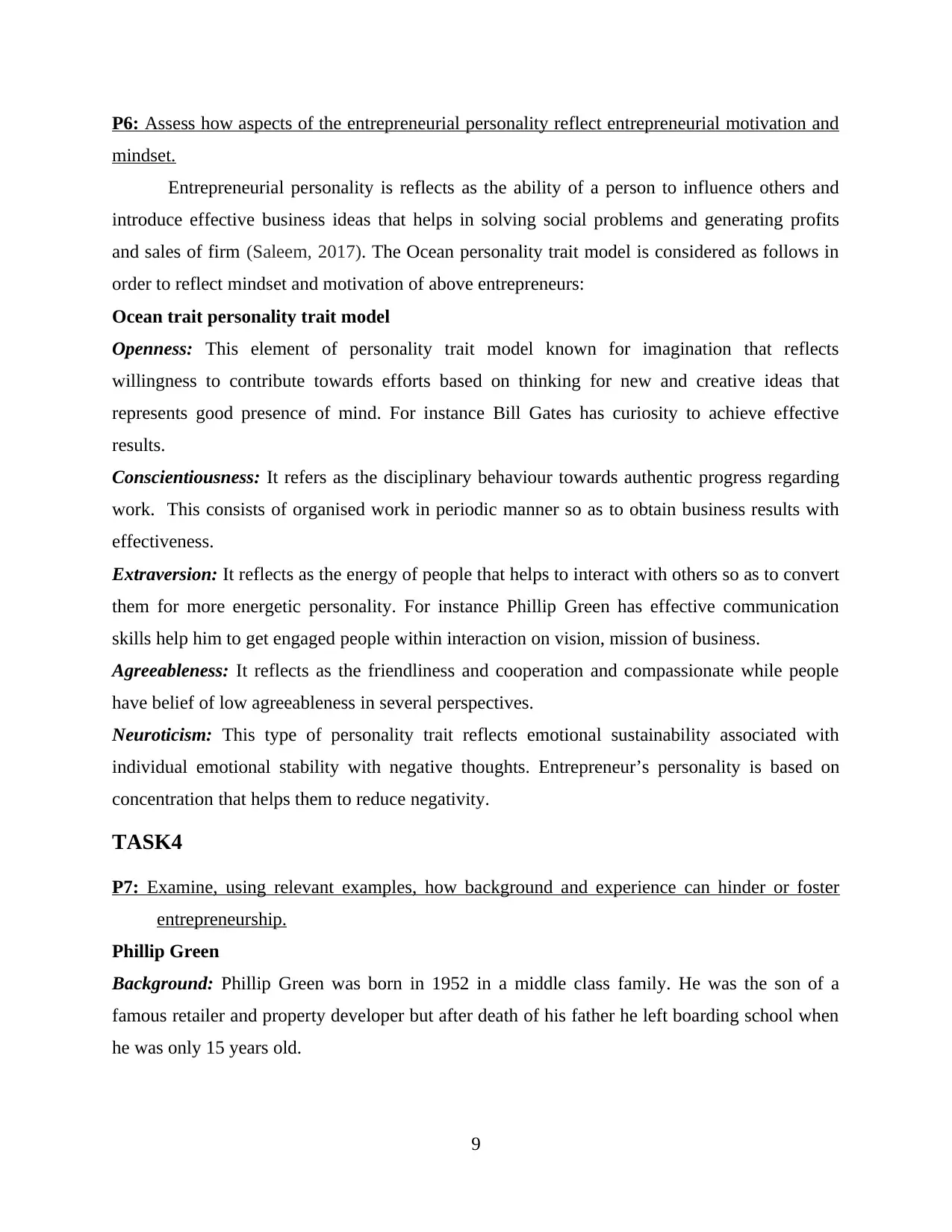
P6: Assess how aspects of the entrepreneurial personality reflect entrepreneurial motivation and
mindset.
Entrepreneurial personality is reflects as the ability of a person to influence others and
introduce effective business ideas that helps in solving social problems and generating profits
and sales of firm (Saleem, 2017). The Ocean personality trait model is considered as follows in
order to reflect mindset and motivation of above entrepreneurs:
Ocean trait personality trait model
Openness: This element of personality trait model known for imagination that reflects
willingness to contribute towards efforts based on thinking for new and creative ideas that
represents good presence of mind. For instance Bill Gates has curiosity to achieve effective
results.
Conscientiousness: It refers as the disciplinary behaviour towards authentic progress regarding
work. This consists of organised work in periodic manner so as to obtain business results with
effectiveness.
Extraversion: It reflects as the energy of people that helps to interact with others so as to convert
them for more energetic personality. For instance Phillip Green has effective communication
skills help him to get engaged people within interaction on vision, mission of business.
Agreeableness: It reflects as the friendliness and cooperation and compassionate while people
have belief of low agreeableness in several perspectives.
Neuroticism: This type of personality trait reflects emotional sustainability associated with
individual emotional stability with negative thoughts. Entrepreneur’s personality is based on
concentration that helps them to reduce negativity.
TASK4
P7: Examine, using relevant examples, how background and experience can hinder or foster
entrepreneurship.
Phillip Green
Background: Phillip Green was born in 1952 in a middle class family. He was the son of a
famous retailer and property developer but after death of his father he left boarding school when
he was only 15 years old.
9
mindset.
Entrepreneurial personality is reflects as the ability of a person to influence others and
introduce effective business ideas that helps in solving social problems and generating profits
and sales of firm (Saleem, 2017). The Ocean personality trait model is considered as follows in
order to reflect mindset and motivation of above entrepreneurs:
Ocean trait personality trait model
Openness: This element of personality trait model known for imagination that reflects
willingness to contribute towards efforts based on thinking for new and creative ideas that
represents good presence of mind. For instance Bill Gates has curiosity to achieve effective
results.
Conscientiousness: It refers as the disciplinary behaviour towards authentic progress regarding
work. This consists of organised work in periodic manner so as to obtain business results with
effectiveness.
Extraversion: It reflects as the energy of people that helps to interact with others so as to convert
them for more energetic personality. For instance Phillip Green has effective communication
skills help him to get engaged people within interaction on vision, mission of business.
Agreeableness: It reflects as the friendliness and cooperation and compassionate while people
have belief of low agreeableness in several perspectives.
Neuroticism: This type of personality trait reflects emotional sustainability associated with
individual emotional stability with negative thoughts. Entrepreneur’s personality is based on
concentration that helps them to reduce negativity.
TASK4
P7: Examine, using relevant examples, how background and experience can hinder or foster
entrepreneurship.
Phillip Green
Background: Phillip Green was born in 1952 in a middle class family. He was the son of a
famous retailer and property developer but after death of his father he left boarding school when
he was only 15 years old.
9
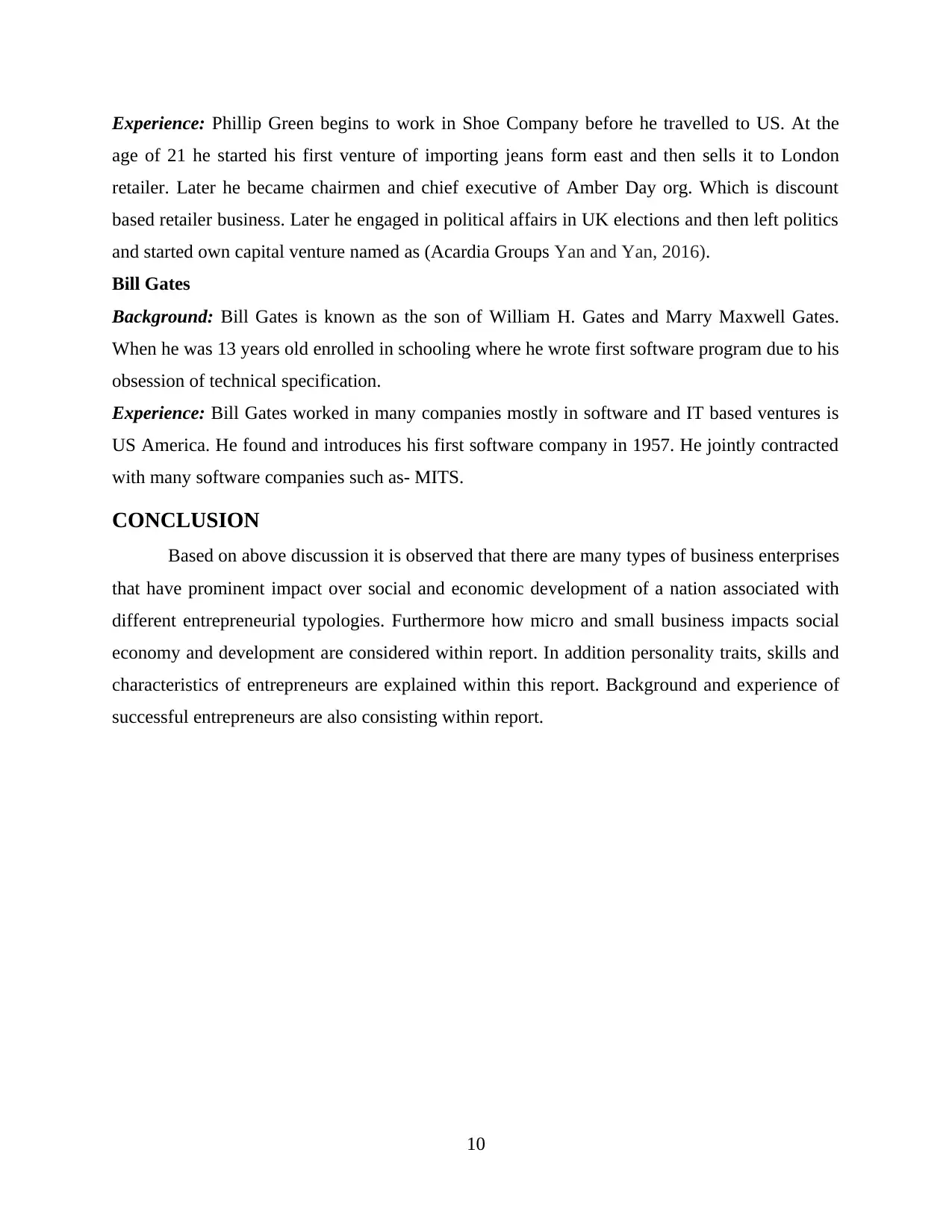
Experience: Phillip Green begins to work in Shoe Company before he travelled to US. At the
age of 21 he started his first venture of importing jeans form east and then sells it to London
retailer. Later he became chairmen and chief executive of Amber Day org. Which is discount
based retailer business. Later he engaged in political affairs in UK elections and then left politics
and started own capital venture named as (Acardia Groups Yan and Yan, 2016).
Bill Gates
Background: Bill Gates is known as the son of William H. Gates and Marry Maxwell Gates.
When he was 13 years old enrolled in schooling where he wrote first software program due to his
obsession of technical specification.
Experience: Bill Gates worked in many companies mostly in software and IT based ventures is
US America. He found and introduces his first software company in 1957. He jointly contracted
with many software companies such as- MITS.
CONCLUSION
Based on above discussion it is observed that there are many types of business enterprises
that have prominent impact over social and economic development of a nation associated with
different entrepreneurial typologies. Furthermore how micro and small business impacts social
economy and development are considered within report. In addition personality traits, skills and
characteristics of entrepreneurs are explained within this report. Background and experience of
successful entrepreneurs are also consisting within report.
10
age of 21 he started his first venture of importing jeans form east and then sells it to London
retailer. Later he became chairmen and chief executive of Amber Day org. Which is discount
based retailer business. Later he engaged in political affairs in UK elections and then left politics
and started own capital venture named as (Acardia Groups Yan and Yan, 2016).
Bill Gates
Background: Bill Gates is known as the son of William H. Gates and Marry Maxwell Gates.
When he was 13 years old enrolled in schooling where he wrote first software program due to his
obsession of technical specification.
Experience: Bill Gates worked in many companies mostly in software and IT based ventures is
US America. He found and introduces his first software company in 1957. He jointly contracted
with many software companies such as- MITS.
CONCLUSION
Based on above discussion it is observed that there are many types of business enterprises
that have prominent impact over social and economic development of a nation associated with
different entrepreneurial typologies. Furthermore how micro and small business impacts social
economy and development are considered within report. In addition personality traits, skills and
characteristics of entrepreneurs are explained within this report. Background and experience of
successful entrepreneurs are also consisting within report.
10
Paraphrase This Document
Need a fresh take? Get an instant paraphrase of this document with our AI Paraphraser
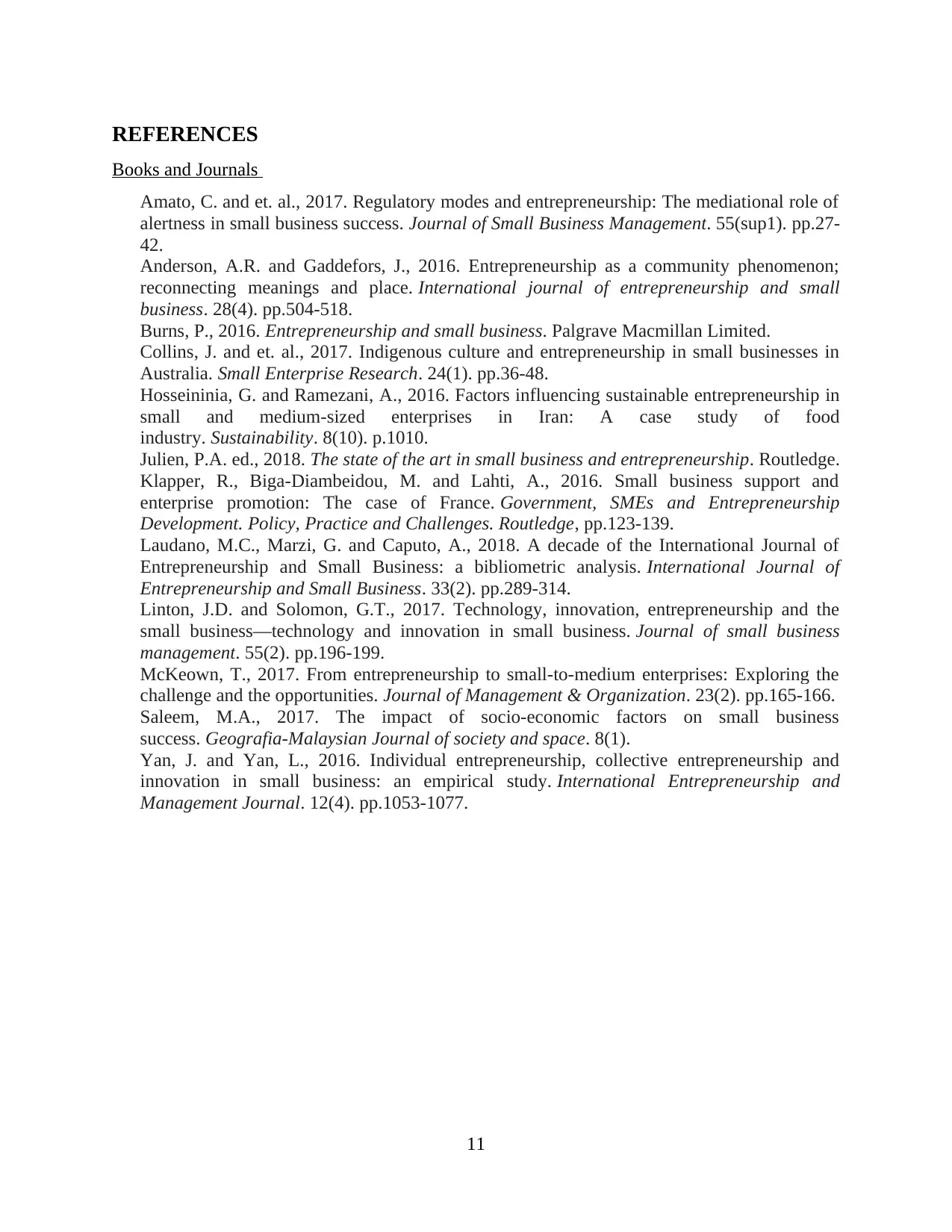
REFERENCES
Books and Journals
Amato, C. and et. al., 2017. Regulatory modes and entrepreneurship: The mediational role of
alertness in small business success. Journal of Small Business Management. 55(sup1). pp.27-
42.
Anderson, A.R. and Gaddefors, J., 2016. Entrepreneurship as a community phenomenon;
reconnecting meanings and place. International journal of entrepreneurship and small
business. 28(4). pp.504-518.
Burns, P., 2016. Entrepreneurship and small business. Palgrave Macmillan Limited.
Collins, J. and et. al., 2017. Indigenous culture and entrepreneurship in small businesses in
Australia. Small Enterprise Research. 24(1). pp.36-48.
Hosseininia, G. and Ramezani, A., 2016. Factors influencing sustainable entrepreneurship in
small and medium-sized enterprises in Iran: A case study of food
industry. Sustainability. 8(10). p.1010.
Julien, P.A. ed., 2018. The state of the art in small business and entrepreneurship. Routledge.
Klapper, R., Biga-Diambeidou, M. and Lahti, A., 2016. Small business support and
enterprise promotion: The case of France. Government, SMEs and Entrepreneurship
Development. Policy, Practice and Challenges. Routledge, pp.123-139.
Laudano, M.C., Marzi, G. and Caputo, A., 2018. A decade of the International Journal of
Entrepreneurship and Small Business: a bibliometric analysis. International Journal of
Entrepreneurship and Small Business. 33(2). pp.289-314.
Linton, J.D. and Solomon, G.T., 2017. Technology, innovation, entrepreneurship and the
small business—technology and innovation in small business. Journal of small business
management. 55(2). pp.196-199.
McKeown, T., 2017. From entrepreneurship to small-to-medium enterprises: Exploring the
challenge and the opportunities. Journal of Management & Organization. 23(2). pp.165-166.
Saleem, M.A., 2017. The impact of socio-economic factors on small business
success. Geografia-Malaysian Journal of society and space. 8(1).
Yan, J. and Yan, L., 2016. Individual entrepreneurship, collective entrepreneurship and
innovation in small business: an empirical study. International Entrepreneurship and
Management Journal. 12(4). pp.1053-1077.
11
Books and Journals
Amato, C. and et. al., 2017. Regulatory modes and entrepreneurship: The mediational role of
alertness in small business success. Journal of Small Business Management. 55(sup1). pp.27-
42.
Anderson, A.R. and Gaddefors, J., 2016. Entrepreneurship as a community phenomenon;
reconnecting meanings and place. International journal of entrepreneurship and small
business. 28(4). pp.504-518.
Burns, P., 2016. Entrepreneurship and small business. Palgrave Macmillan Limited.
Collins, J. and et. al., 2017. Indigenous culture and entrepreneurship in small businesses in
Australia. Small Enterprise Research. 24(1). pp.36-48.
Hosseininia, G. and Ramezani, A., 2016. Factors influencing sustainable entrepreneurship in
small and medium-sized enterprises in Iran: A case study of food
industry. Sustainability. 8(10). p.1010.
Julien, P.A. ed., 2018. The state of the art in small business and entrepreneurship. Routledge.
Klapper, R., Biga-Diambeidou, M. and Lahti, A., 2016. Small business support and
enterprise promotion: The case of France. Government, SMEs and Entrepreneurship
Development. Policy, Practice and Challenges. Routledge, pp.123-139.
Laudano, M.C., Marzi, G. and Caputo, A., 2018. A decade of the International Journal of
Entrepreneurship and Small Business: a bibliometric analysis. International Journal of
Entrepreneurship and Small Business. 33(2). pp.289-314.
Linton, J.D. and Solomon, G.T., 2017. Technology, innovation, entrepreneurship and the
small business—technology and innovation in small business. Journal of small business
management. 55(2). pp.196-199.
McKeown, T., 2017. From entrepreneurship to small-to-medium enterprises: Exploring the
challenge and the opportunities. Journal of Management & Organization. 23(2). pp.165-166.
Saleem, M.A., 2017. The impact of socio-economic factors on small business
success. Geografia-Malaysian Journal of society and space. 8(1).
Yan, J. and Yan, L., 2016. Individual entrepreneurship, collective entrepreneurship and
innovation in small business: an empirical study. International Entrepreneurship and
Management Journal. 12(4). pp.1053-1077.
11
1 out of 14
Related Documents
Your All-in-One AI-Powered Toolkit for Academic Success.
+13062052269
info@desklib.com
Available 24*7 on WhatsApp / Email
![[object Object]](/_next/static/media/star-bottom.7253800d.svg)
Unlock your academic potential
© 2024 | Zucol Services PVT LTD | All rights reserved.





